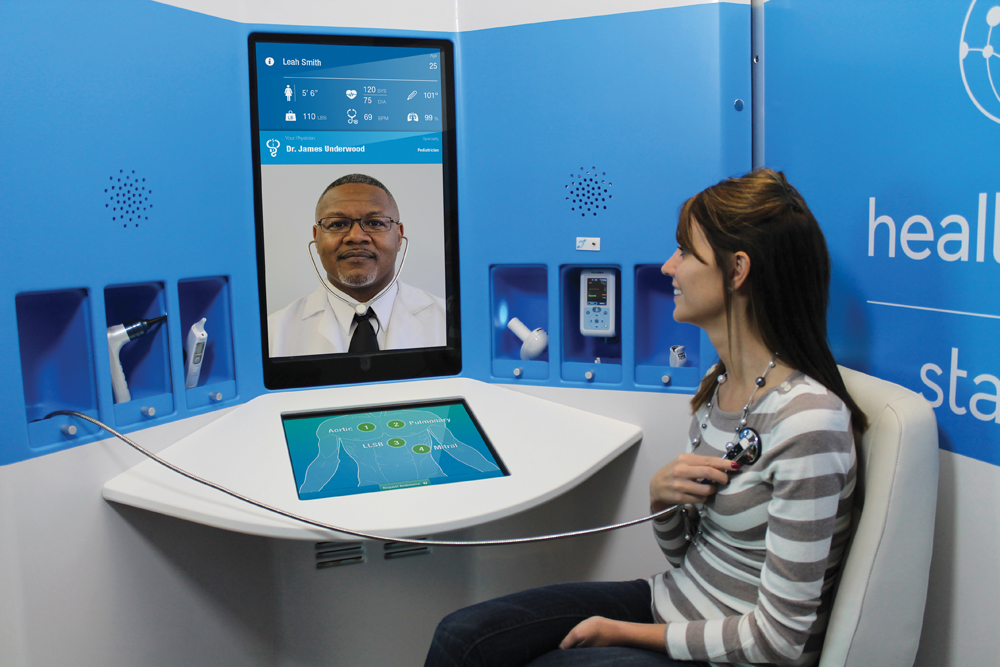The HealthSpot station is an 8x5-foot, ADA-compliant mobile kiosk that lets patients access a network of board-certified physicians through interactive videoconferencing and medical devices, such as stethoscopes, scanners, and thermometers. From that information, the remote doctors can make diagnoses and prescribe advice and medicine.
“We’re bringing the doctor to the patient,” says Steve Cashman, CEO and Founder of Dublin, Ohio-based HealthSpot, which launched its first station at the Consumer Electronics Show last December.
As of mid-October, about a dozen HealthSpots were in use. Eight healthcare systems in Minnesota, Miami, San Diego, and Ohio—including the prestigious Cleveland Clinic—were making caregivers available. Customers can be treated for common health conditions—colds and flu, rashes and skin conditions, eye conditions, earaches, and seasonal allergies.
On November 10, pharmacy chain Rite Aid announced that it had entered into an agreement with HealthSpot to install stations at select Rite Aid locations in the Akron/Canton, Cleveland, and Dayton/Springfield markets in Ohio.
The HealthSpot station was designed by Cleveland-based architectural firm Nottingham Spirk. Bill Nottingham, a Principal, says the station had to be portable, but not so small as to feel claustrophobic. An arched ceiling gives the pod some breathing room
Ohio-based Commercial Vehicle Group, a manufacturer of truck cabs, makes the stations. The units are shipped in pieces and reassembled on site. HealthSpot is providing the units to client locations for a one-time implementation fee to cover the installation, plus a monthly maintenance and licensing fee. Cashman estimates the stations are profitable when they handle at least six patients a day.
Cashman says he plans to place another 100 HealthSpots into the market in early 2015. He says he envisions them being installed on college campuses, in retail malls, and in assisted living facilities.
Read about more innovations from BD+C's 2014 Great Solutions Report
Related Stories
| Aug 11, 2010
Wisconsin becomes the first state to require BIM on public projects
As of July 1, the Wisconsin Division of State Facilities will require all state projects with a total budget of $5 million or more and all new construction with a budget of $2.5 million or more to have their designs begin with a Building Information Model. The new guidelines and standards require A/E services in a design-bid-build project delivery format to use BIM and 3D software from initial ...
| Aug 11, 2010
Opening night close for Kent State performing arts center
The curtain opens on the Tuscarawas Performing Arts Center at Kent State University in early 2010, giving the New Philadelphia, Ohio, school a 1,100-seat multipurpose theater. The team of Legat & Kingscott of Columbus, Ohio, and Schorr Architects of Dublin, Ohio, designed the 50,000-sf facility with a curving metal and glass façade to create a sense of movement and activity.
| Aug 11, 2010
Residence hall designed specifically for freshman
Hardin Construction Company's Austin, Texas, office is serving as GC for the $50 million freshman housing complex at the University of Houston. Designed by HADP Architecture, Austin, the seven-story, 300,000-sf facility will be located on the university's central campus and have 1,172 beds, residential advisor offices, a social lounge, a computer lab, multipurpose rooms, a fitness center, and a...
| Aug 11, 2010
News Briefs: GBCI begins testing for new LEED professional credentials... Architects rank durability over 'green' in product attributes... ABI falls slightly in April, but shows market improvement
News Briefs: GBCI begins testing for new LEED professional credentials... Architects rank durability over 'green' in product attributes... ABI falls slightly in April, but shows market improvement
| Aug 11, 2010
Luxury Hotel required faceted design
Goettsch Partners, Chicago, designed a new five-star, 214-room hotel for the King Abdullah Financial District (KAFD) in Riyadh, Saudi Arabia. The design-build project, with Saudi Oger Ltd. as contractor and Rayadah Investment Co. as developer, has a three-story podium supporting a 17-story glass tower with a nine-story opening that allows light to penetrate the mass of the building.
| Aug 11, 2010
Three Schools checking into L.A.'s Ambassador Hotel site
Pasadena-based Gonzalez Goodale Architects is designing three new schools for Los Angeles Unified School District's Central Wilshire District. The $400 million campus, located on the site of the former Ambassador Hotel, will house a K-5 elementary school, a middle school, a high school, a shared recreation facility (including soccer field, 25-meter swimming pool, two gymnasiums), and a new publ...
| Aug 11, 2010
New Jersey's high-tech landscaping facility
Designed to enhance the use of science and technology in Bergen County Special Services' landscaping programs, the new single-story facility at the technical school's Paramus campus will have 7,950 sf of classroom space, a 1,000-sf greenhouse (able to replicate different environments, such as rainforest, desert, forest, and tundra), and 5,000 sf of outside landscaping and gardening space.
| Aug 11, 2010
U.S. firm designing massive Taiwan project
MulvannyG2 Architecture is designing one of Taipei, Taiwan's largest urban redevelopment projects. The Bellevue, Wash., firm is working with developer The Global Team Group to create Aquapearl, a mixed-use complex that's part of the Taipei government's "Good Looking Taipei 2010" initiative to spur redevelopment of the city's Songjian District.







